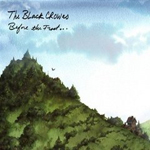Duke Ellington (with Charlie Mingus and Max Roach) “Money Jungle” Classic Records
- Performance:

- Sound:

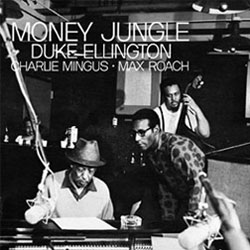
When I think of Duke Ellington, I think of Big Bands and his “Live at Newport” album from 1956. I bought “Money Jungle” based on the album cover and the fact that it was released by Classic Records. The cover photo shows The Duke and drummer Max Roach commiserating at the piano while the formidable Charles Mingus looks on in the background with his bass. It’s in black and white. The music is not. This isn’t Big Band music, but it’s impossible to imagine three musicians making a noise this big with no overdubs. This heavyweight trio recorded “Money Jungle” on September 17, 1962. That was a good day for American music, folks.
The title track gets things started with a wild flourish – nothing like what one would expect from a “traditional” Ellington record. Mingus’s bass stands out as counterpoint to almost everything Ellington does with his piano. It’s almost confrontational which isn’t hard to believe if you’ve ever read anything about Mingus’s personality. He repeats the same single note on “Money Jungle” until it makes you uncomfortable. (I saw a preview for the new Coen Brothers movie recently wherein the lead character is shown getting his head repeatedly smashed into what I believe is a school locker. This is shown at the beginning of the clip, but the sound of the character’s head against the locker is heard throughout the trailer over the rest of the action and dialogue. It goes on for so long that you get uneasy and can’t think of much else no matter what is being shown on screen. Mingus’s bass has a similar effect on the title track to “Money Jungle.” He plays this same insistent note so many times that you hear it even after he’s stopped.) The song is frantic, and conjures big city images of hipsters moving quickly, wearing tight suits and sunglasses. I see taxi cabs and neon. The song somehow works despite the tension and complexity. Such is life. “Le Fleurs Africaines” is more agreeable and a lot quieter. All of the players rein it in some giving the listener a well-earned rest after the agitating opener. It’s as beautiful in its simplicity as “Money Jungle” is demented. Things start to swing a little with “Very Special,” even without the orchestra that one typically associates with Ellington. That’s not to say that it’s swing music, but it’s lively and structured and you can hear how the song could support the weight of a larger ensemble if needed. Roach drums up some quiet chaos while his mates walk and “talk” in the forefront. “Warm Valley” is recognizable even to a novice such as myself, giving the listener a familiar foothold in what is very uncommon terrain up until then. “Wig Wise” gets things cranking on side two with Ellington responding to himself on his piano before giving Mingus a chance to interject some thoughts of his own. Two standards, “Caravan” and “Solitude” round out the album making the bedlam of the title track seem like a far away dream…
So, “Money Jungle” confirms some suspicions that I’ve had all along. That is to say, Duke Ellington was one of the classiest players ever. Max Roach was one of the more accomplished drummers of any musical genre anywhere. (He could make them talk, and he could express himself as a soloist or accompanist depending on the scene and the circumstance.) And Charles Mingus was a bull-moose lunatic with a stand up bass in his hands. (He was rumored to have been the only band member that Ellington ever personally fired although that event had taken place a few years prior to the “Money Jungle” session. All’s well that ends well.) Art can be a lot of things including a challenge. “Money Jungle” is just that at times, but can be enjoyed as purely pleasurable at others. It’s a complex record by legendarily complicated personalities. There’s no way that I’d rather hear it than on a high-quality vinyl release from the folks at Classic Records. They do this album justice and that’s saying something. I’d recommend it to anyone that enjoys jazz or “American music,” as Ellington liked to call it.
Townes Van Zandt “Townes Van Zandt” Fat Possum Records
- Performance:

- Sound:

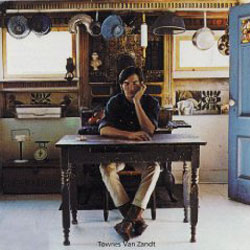
Last month, I threatened to spin off on a Townes Van Zandt bender after hearing Steve Earle’s recent Van Zandt tribute album. I didn’t exactly keep my word, but I did pick up “Townes Van Zandt,” by the original artist, and I’ve listened to it quite a lot over the last month. I’ve already admitted my embarrassment at not being more familiar with Van Zandt’s work. Earle’s album was a welcome introduction, and the collection has begun. Still, I’d be surprised to learn that “TVZ” is Van Zandt’s greatest achievement. It’s more than listenable, but a little less than awe-inspiring. I look at it as exposition, and I can’t wait until the next chapter.
“TVZ” contains four of the original compositions that were found on Earle’s “Townes.” I was blown out of the water by Earle’s record so I figured this would be as good a place as any to get started with the source material. It’s almost what I expected, just a little less rockin’. There’s nothing performance-wise that seems too virtuosic. The magic, as they say, is in the songs. That doesn’t mean Van Zandt can’t sing and play. He can. But his performance is more “solid” than overwhelming. These songs kind of ease their way into your psyche and incubate for a few days until you fully absorb them. You pick up on the lonesome cowboy melody of “Columbine” more quickly than the message in “For The Sake Of The Song,” but they’ll both stick with you after a couple of listens. It’s easy to romanticize the destructive lifestyle that is so fundamental to Van Zandt’s legend while listening to “Waitin’ Around to Die,” but I personally prefer the mountain stomp and slide guitar of “Lungs.” Things can veer treacherously close to “American Pie” territory during “Fare Thee Well, Ms. Carousel,” but “I’ll Be Here In The Morning” is solid melody, and gut feeling with none of the mid-’70’s schmaltz associated with Don McLean and artists of that ilk. (Note: Van Zandt’s song pre-dates McLean’s so there’s no chance that “American Pie” spawned “Fare Thee Well.”) The “Greatest Songwriter” discussion can get pretty lively and typically involves only a handful of finalists. Townes Van Zandt has been right in the running all along and the songs on “TVZ” back up his nomination. This album’s a bit of a “grower” too as I’m enjoying it more and more with every listen. Van Zandt fans are a passionate lot, and I’ve probably offended most of them already with my lack of knowledge, but I can’t help wondering if they got hooked right away or if the addiction crept up on them. Van Zandt’s voice is not as remarkable as Gram Parsons’s (for instance), but it shares a similar wounded quality and is really quite soothing after a couple of listens. I can see where you might get hooked if you’re partial to the singer-songwriter genre. Van Zandt’s music is comfortable in a “warm blanket” kind of way which is perfect if you’re not pre-disposed to the full-band setup. I am, but that’s just me.
Fat Possum Records recently acquired the rights to some of Townes Van Zandt’s catalogue. That’s good news for fans, but not so much for audiophiles. The issue is that Fat Possum’s vinyl releases always seem to be of inferior quality. My copy of “Townes Van Zandt” has paper scuffs and strange markings. The sound is decent, but that’s not really what we’re going for. I cleaned my copy with a Nitty Gritty brand record cleaner and it cleared up some of the surface noise. This is a no frills release with no digital copy or liner notes. That’s unfortunate because I’ve found very little information about this record online. I’d like to know a little bit about the history of it and what was happening in Van Zandt’s life when he recorded it. There’s a great documentary about Van Zandt called “Be Here To Love Me” which is readily available, and can help fill in the gaps for those who are interested. I plan to familiarize myself with more of his work before watching it again. And I’ll probably do that by purchasing more inferior vinyl from the folks at Fat Possum. One must be of one’s time, after all, and this is what we have to work with for now.
Jerry Lee Lewis “Original Sun Singles ’56 – ’60” Sundazed
- Performance:

- Sound:

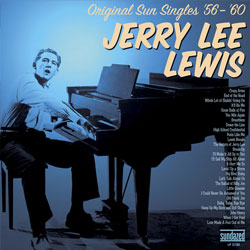
I can’t imagine what I’d have thought of Jerry Lee Lewis in 1956 when he unleashed “Whole Lot Of Shakin’ Going On.” I may not have known what to think one way or the other, but I like to imagine I’d have loved his music like I do now. That is to say: a lot. I’ve always preferred Lewis to Elvis as far as artists of that era go, & the Sundazed mono reissue of the “Original Sun Singles ’56 – ’60” is a potent cocktail of early rock ‘n’ roll highballs, to say the least. My mom says she loved him, and that my grandparents were appropriately confused by him. I liken it to the furor over artists like 50 Cent today. It’s probably tougher to rattle folks’ cages now than it was in ’56, but someone will always come along to get the job done. It’s a time honored tradition, but I doubt anyone’s ever rattled them more effectively than Jerry Lee. He walked the walk offstage too. Just like the current stable of hip-hop artists doing time for the very crimes that they reference in their work, Jerry Lee always had a lot of shakin’ going on and quite often had “chicken in the barn” too. Mothers, lock up your daughters indeed.
Southern artists seem to struggle with more than their fair share of religious observance versus lusty release. (Even today, the Kings of Leon continue to shed their Pentecostal upbringing in favor of “Sex On Fire.”) Jerry Lee is first cousin to the fallen televangelist, Jimmy Swaggart, and the two were quite close at one time. Jerry Lee had a killer Gospel era too, just like Elvis and Little Richard. A lot of those records are magnificent, but the real goods are in the rock ‘n’ roll that he helped invent, and the country romps that he helped to advance. And they’re all in this collection. “Whole Lot Of Shakin’ Going On” is still one of my all-time favorite rock songs of any era, and Lewis’s take on Hank Williams’s “You Win Again” will leave you “Breathless.” Jerry Lee’s legend could have survived on the strength of those songs alone, and we haven’t even gotten to “Great Balls of Fire” or “High School Confidential.” And we’ll still be on the first record of this two-disc set when we do! The only misfire on the set is “The Return Of Jerry Lee” which is a cobbled together compendium of some of his hits interspersed with fake news snippets acknowledging his legal troubles of the time. It’s an early gimmick to capitalize on a popular artist’s tabloid troubles. Twenty-one year old Jerry Lee had taken the hand of his thirteen year old girlfriend in marriage, you understand. His first marriage had not been completely dissolved either. And his newest wife was also his cousin. This derailed his career considerably, as one might expect in 1958. Much more so than Chris Brown’s career has been derailed by assaulting his ex-girlfriend, Rhianna, earlier this year. Go figure.
It’s easy to forget, in light of his sordid life story, that Jerry Lee Lewis is one of the most accomplished pianists in all of rock history. He could carry a tune too. He’s a deceptively skillful vocalist and this is especially evident on the country material. It’s easy, however, to recognize (or remember) the depth of his talent while listening to this set. The sound is superb as is the production. These singles were recorded in a simpler time when players got together in a room and a producer captured the sounds they made without any added clutter. The mono presentation further simplifies the process and that’s all these songs require. Heaping superlatives onto Jerry Lee’s legend is like carrying sand to the beach at this point. You either like beaches or you’re a weirdo. Same with Jerry Lee, as far as I’m concerned. I had the great fortune to have caught the Killer live a couple of years ago. He was playing at one of the outdoor sheds and his energy and charisma still came across all the way out to the lawn where I was sitting. He still had the slicked back hair, the black leather jacket, and more attitude than your petulant teen aged nephew. He walked pretty slowly, but his fingers can still fly. I’ll count it as one of my personal favorite rock ‘n’ roll moments, and I’ll count this record as one of my favorite rock ‘n’ roll documents. I should probably buy another one while they’re still available. I’m wearing mine out already, and I like to imagine that Jerry Lee’s someplace wearing out a piano while I’m listening.
Benji Hughes “A Love Extreme” New West
- Performance:

- Sound:

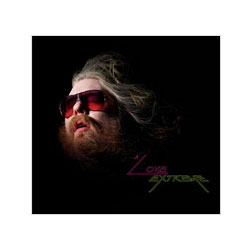
I typically form a solid opinion of the music I’m hearing on the first listen. I rarely look back at something I liked and wonder what I was thinking. It happened more when I was younger. I suspect that’s normal. The older we get, the more intimately we know ourselves and the more adept we are at recognizing what we find appealing right away. A friend visited me from Charlotte recently. He’s a music freak like me, and we both acquire music at an alarming rate. I expected him to show up with a spool of burnt CDs to turn me on to, but he showed up with one. It was “A Love Extreme” by Benji Hughes. Hughes also lives in Charlotte and seems to have gotten his name out in that neck of the woods as some friends from Atlanta had also recommended him. I gave it a listen, and I was not immediately enamored of what I heard. I wondered what all the fuss was about. Now, I wonder what I was thinking.
Perhaps the Mp3 format was disagreeable to me. Perhaps I’m making excuses for myself. But I must have heard something in the music that piqued my interest because I came back to it a couple of times and eventually picked up the vinyl. That changed things considerably. “A Love Extreme” benefits from the vinyl experience more so than almost any other work I can think of, and it’s quite an experience, I must say. This is Hughes’s major league debut, and it grows on you like the kudzu that’s so indigenous to his area. At twenty five songs, it’s also quite ambitious. There’s no filler here either. The man threw a complete game shut out in his first start. He’s got an arsenal of tricks to choose from, and his delivery keeps the listener off balance and engaged throughout. For the life of me, I can’t imagine why I wasn’t into it from the start.
Hughes looks like he was in Molly Hatchet, but croons like any number of lounge singers. (Are there still lounge singers?) He can switch styles like Beck, but sounds nothing like Beck. Hughes sounds like Hughes. I wouldn’t compare him to anyone else. The subject matter is standard rock ‘n’ roll subject matter: dates gone bad, lack of dates, the expensiveness of dating, intolerant neighbors with no appreciation for rocking out, etc. The attitude, essentially, is total rock star while the delivery is more appropriate for the piano bar. There are Prince-like guitar sounds over electronic beats and synthesizers. Philly soul harmonies over fuzz tone bass, and a couple of instrumentals thrown in as what seems like theme music. Hughes’s strength as a composer might be obscured by the instrumental complexity on the first couple of listens, but it catches up with you pretty quickly if you give it a chance. “You Stood Me Up” could be a hit radio single (and may be for all I know), but I imagine the rest of the album is more of a niche find for true music lovers whose ears don’t require the standard radio format. Hopefully, we won’t have to wait long as “A Love Extreme” was released last July. I’m a little late to the game this time, but I’ll be looking for his next one with giddy expectancy. I’m looking for a curve ball with killer movement that still finds the zone. I wouldn’t bet against this guy’s talent.
Big Star “Radio City” Ardent/Classic Records
- Performance:

- Sound:

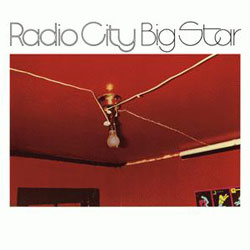
Big Star’s “Radio City” grabs you by the throat from the first note and it doesn’t let go until the needle leaves the groove. It’s a power pop masterpiece, and I don’t think anyone will be fool enough to debate that with me. It was originally released under duress in 1974. The band members were wearing thin from non-recognition and “Radio City” (their second release) went nowhere on the charts. You can still find plenty of rock aficionados around that don’t know much about Alex Chilton’s trio, but you can’t find any original vinyl copies of their albums. I wonder if I’d know about them today if my lifelong buddy hadn’t introduced me to their work while we were in college. I’d like to think that I would, but who knows? (They were responsible for the theme song during the opening credits on “That ’70’s Show,” but that doesn’t do their legend justice. Nothing does.) They still fly somewhat under the radar, but the fans they have are rabid and I know why.
“O My Soul” could have been any great band’s best song, but it’s just another strong one on “Radio City.” Classic Records handled the re-issue that we’re talking about, and I swear it’s like having the group scream the song live in your home. The instruments are so clear and alive that it makes your fingers hurt from playing air guitar. Chilton’s vocals on “September Gurls” sound so honest and clean that you feel like you could buy him a beer and enjoy it with him on the spot. And I guess that’s really who we have to thank for most of this. Alex Chilton had already gone through several stylistic changes by the time “Radio City” saw daylight. You’d be hard pressed to even identify him as the lead singer in the Box Tops based on the Big Star sound. He hinted at some of the funk that was to come on his solo “1970” record (which wasn’t released until the 1990’s), but nothing could have prepared his audience for Big Star’s unveiling. I guess there weren’t tons of fans to raise a ruckus about it back then, but you could ask the guys in R.E.M. about him today and I bet they’d have some info for you. I suspect that Big Star has inspired their listeners on a level akin to the Velvet Underground’s influence. I don’t have any scientific data to back this up, but I’d bet the farm on it.
“Radio City” weighs in at a mere 36 minutes, but no groove is spared, no tone wasted, and no fat was left on the bone. There’s no overt political message, no mid-70’s prog-rock experimentation, nor did they invent a new sound. This is guitar-based pop-rock with sweet melodies. No tricks and no chaser. These are masterful performances of magical songs, and I can’t say enough about the quality of this re-issue from Classic Records. The sound is superb and the packaging is a modern marvel. The disc is of the 200 gram variety, and it’s free of the standard black dye. This is supposed to help with the fidelity during playback, but I’m not technically aware enough to know why. I do know that this version of “Radio City” ranks around the top of my list of best sounding records. There are no frills regarding liner notes or extras, but that’s how it was in ’74 and that’s plenty fine with me now. I’ll keep a watchful eye on the goings on at Classic Records from this day forth. Their records are pricey, but a lesser copy wouldn’t be worth the nagging voice in my head telling me that there’s a better version out there somewhere. You shouldn’t really be worrying about money when you’re listening to “Radio City” anyway. You should be worrying about completing your Big Star collection.


